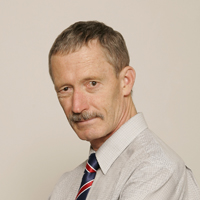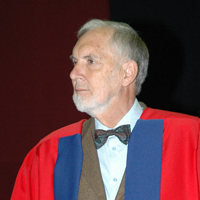Latest News Archive
Please select Category, Year, and then Month to display items
12 January 2024
|
Story Nonsindiswe Qwabe
|
Photo Sonia Small
 Since joining the UFS in 2008, Dr Grey Magaiza has worked extensively on approaches that can foster the socio-economic transformation of societies.
Since joining the UFS in 2008, Dr Grey Magaiza has worked extensively on approaches that can foster the socio-economic transformation of societies.
“The future should be one where communities can decide on their development agenda and futures. That’s the most important for me.” Dr Grey Magaiza, Deputy Director of the Centre for Gender and Africa Studies (CGAS) and Head of the Community Development programme on the Qwaqwa Campus, is passionate about capacitating communities to be agents of change and advancement. His vision for the future emphasises the empowerment of communities to take charge of their development by actively participating in decision making and the implementation of development projects that can improve their lives.
Since joining the UFS in 2008, Dr Magaiza has worked extensively on approaches that can foster the socio-economic transformation of societies. Over the years, he has crafted his research speciality into one that he is most proud of – being an interdisciplinary scientist immersed in the development of communities.
“I’m in a fortunate position of researching what I like. I say ‘fortunate’, because I’ve taken the time to understand what I’m passionate about, which is the overall field of rural livelihoods and livelihood futures – in short, community development. My research starts from an engaged university, understanding the elements that a university must use to enhance transformation and relevance to its immediate community in terms of development.”
One of the ways he has done this is by looking at social entrepreneurship as a development approach for young people in a rural setting. Through workshops with non-profit and civic organisations in Qwaqwa, Dr Magaiza has been helping these organisations to map out their needs and actively meet them through the involvement and support of external role players.
“We understand that communities are part of the national development agenda, but even that national agenda respects community knowledge and intentions and allows communities to shape their identity. A critical enabler of this is community organising. You bring back the capacity in communities to have dialogues on issues affecting them as spaces for engagement, knowledge exchange, and for people to just talk about their way forward.”
By enabling communities to define their development agenda, they can address their specific needs, challenges, and aspirations, he said. “When I look at livelihood futures, it’s quite an exciting aspect of my work – it’s like looking into a fortune tellers’ globe, because you’re not deciding for communities what they should do, but the communities themselves take those decisions.”
Two academics will be sorely missed
2013-04-02
|
 
|
Prof Andrew Marston and Prof Bannie Britz
Photo: Supplied
02 April 2013 |
The staff and students of the University of the Free State (UFS) are deeply saddened by the recent passing in Bloemfontein of two of the university’s most esteemed and renowned academics, Prof Bannie Britz and Prof Andrew Marston.
Prof Britz was the Head of the Department of Architecture from 1992 to 2000. He was renowned in his field, winning numerous prizes for Architecture, including the Gold Medal for Architecture from the South African Academy of Arts and Sciences.
“As professional architect and urban designer, Prof Britz was a much awarded architect who received numerous award of merit from the South African Institute of Architects for buildings erected in South Africa over the years,” said Martie Bitzer, Head of the Department of Architecture.
Apart from his acclaim elsewhere, Prof Britz also played a major role in the day-to-day activities of university’s staff and students. He was responsible for the design of the many walkways on campus and the refurbishment of the Main Building on the Bloemfontein Campus. For the many contributions in his field, Prof Britz was awarded an Honorary Doctorate by the UFS in 2007.
Prof Andrew Marston, a specialist in natural product chemistry and methods associated with the isolation and analysis of medically important chemicals from plants, was appointed from Geneva, Switzerland in 2009 under the UFS Strategic Cluster for Advanced Biomolecular Research.
He obtained a B-rating from the National Research Foundation (NRF) in 2011, and was consequently appointed as a senior professor in die UFS Senior Professor Programme. “He has made valuable contributions to the UFS in terms of teaching and postgraduate supervision, as well as research. In his short stay at the UFS, he already co-authored more than ten papers in international chemistry literature,” said Prof André Roodt, Head of the Department of Chemistry.
His research group was part of a multilateral agreement in the European Union (EU) with a number of African and three European universities. He obtained new research funding from the Seventh Framework Programme of the EU for the Building Sustainable Research Capacity on Plants for Better Public Health in Africa project, from the Norwegian Research Council for bioprospecting and the isolation and structure determination of compounds from plants and algae, and from the South African Rooibos Tea Council.
The memorial service for Prof Britz took place on Friday 5 April 2013 in the Berg-en-Dal Dutch Reformed Church in Bloemfontein. The service for Prof Marston took place in the Trinity Church, Charles Street, Bloemfontein.